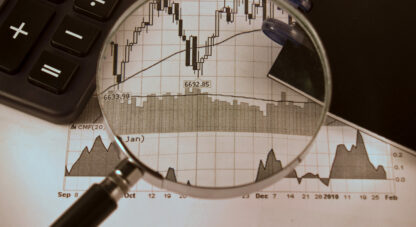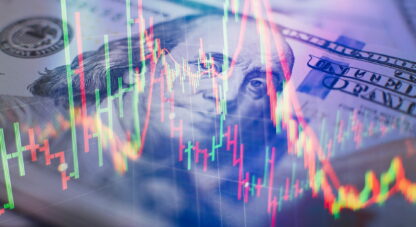About this week’s show:
- Marc Faber & Thomas Sedlacek: Central Bank Insanity
- McAvity & Deeds: We are now in the next great gold rush
- Bill King: Who will take the blame when we have the global collapse
The McAlvany Weekly Commentary
with David McAlvany and Kevin Orrick
“How do you, as an individual, participate in real time and be a man or woman of your times, and yet, also, with wisdom, live outside of your time, and not subject to the tyranny and the dictates of whatever agenda is being pushed? How do you participate in your times and yet stand removed and objective see what is happening?”
– David McAlvany
Kevin: David this is one of those days that I look forward to because when we go back and look in the rear view mirror at shows that we particularly liked or we felt had the theme of the year, when we go back and listen to those again, there is so much learning or relearning that can be had.
David: When I listen to something a second time it seems I learn three times as much. Sometimes that is the same way it is with reading a book. You think that you got everything on the first read, and yet you chew it again and again, and you find there is so much more that can be gotten out of it. So, we look back with some frequency here in the office to either the interviews, or even the conversations you and I have had, and the topics discussed, and remind them, so to say – go back through and find those nuggets and mull them over again, because we cover a lot of ground and sometimes it’s easy from week to week to actually forget some of the key things that have been discussed in the recent past.
Kevin: I think the theme, as I listen back through Marc Faber and Tomas Sedlacek, Ian McAvity, Jim Deeds, Bill King – the theme so far this year is that the central banking community has taught us false thinking. It’s a false religion. Remember when Tomas Sedlacek said, “Somewhere, somebody came up with the idea that we have to have perpetual growth.” But we’ve never seen that through human history. In fact, God says to everything there is a season. There is a time to plant and there is a time to reap. You have growth cycles and you have shrink cycles. Yet the central banks, through almost a false religion, have taught people, “Oh no, no, we have to have continued growth and we will provide that to you.”
David: Right. So, if someone presents a new reality and says, “This is the way it’s going to be from this point forward, we kind of go along to get along, don’t ask any questions, and say, well, surely, someone with a Ph.D. dictating and demanding that this is the way it’s going to be henceforth. We are, again, supposed to go along to get along, and I think what is sacrificed is something of our sanity because we are taught to, whether it is instinctively, or logically, or intuitively, figure things out, and retraining yourself to operate in a world where things don’t make sense is dangerous.
Kevin: I remember when you were asking Marc Faber what he would recommend to investors during this period of time of insanity. I love his thought that you have to maintain your mental health.
David: Yes, I think a part of maintaining mental health is going back through and saying, “What does make sense, what does not make sense?” And sticking to your guns in terms of what is logical and what is, frankly, nonsensical. It doesn’t make sense to go along just to get along when the insane is being proposed.
* * *
What else might you add to a list of investor virtues?
Marc Faber: Well, basically, I think it touches on what you said, some discipline and self-control, and in order to do that I think you have to keep your mental health. And I think you have to also keep some common sense. If I look at the central banks’ policies, in the long run they really do not make any sense at all. And we are probably, today, in an unprecedented period of inflation, but it is hidden, this inflation, because consumer prices are not going up that much. They are going up more than what the Federal Reserve and what the Bureau of Labor Statistics claim because consumer prices would essentially need to be the cost of living, and as you know, the cost of living has gone up a lot everywhere, insurance premiums, health care costs, food costs, rental costs, and so forth.
But we have a huge asset inflation. I can’t imagine any other period in history such as we had between 1980 and today where asset prices have gone up to the same extent as assets such as art, stocks, bonds, homes. Everything is much more expensive than it was 20-30 years ago. And that is overlooked frequently. And it’s huge. We’ll have to rephrase it. Every inflation eventually comes to an end, and ends up in deflation. So this colossal asset inflation one day will end up in a huge asset deflation. It may not imply that the whole world collapses economically because we have in Japan after 1999 the colossal asset deflation. Stocks tumbled by more than 70%, golf club memberships collapsed by 80%, and home prices went down substantially, real estate went down a lot. But the standard of living of ordinary people actually went up because the cost of living went down and the wages were relatively stable.
But it involved a very painful adjustment for the Japanese asset holder, and we asset holders have been rewarded over the last 30 years or so, and I think the next period is a period during which we asset holders will be penalized. So it’s not a very optimistic scenario if you have, say, ten million dollars and you think in five years’ time you will have 20 or 30. Maybe you end up with half as many. But if you lose 50% and other people lose 80%, relatively speaking, you’ve done well.
David: So, coming back to that diversified asset allocation, do you think your best probability of walking through, that is not without harm, but less harm, is by having these baskets of real estate and stocks and precious metals and cash.
Marc Faber: In theory, maybe the best would be to hold 100% cash. But what about if you are wrong, and they print money like crazy and your cash loses as much purchasing power as it lost over the last 30 years? Maybe you bought a house 30 years ago and today the house is worth much more than 30 years ago. You bought stocks 30 years ago, then you made a lot of money in stocks. If you held cash you haven’t made much money. You didn’t lose any, but relatively speaking to the asset, you lost out. So if someone says, “Oh, I don’t trust the system anymore, I’m all in cash.” To this I respond, “What kind of cash do you hold?” He has to choose a currency. “And how do you hold it?” “With the bank.” “What about if the banks go bust?”
These are a lot of issues that the prudent investor has to consider, and the prudent investor, coming back to your question about what else he should do besides discipline and having some courage, it is important to understand that he may have a view about the future, but that view may be wrong, and there are many studies about forecasts, including mine (laughs), and in the long run, most forecasters have a horrible record. So we don’t know how the world will look in five years’ time. In this scenario, I say to myself, “I don’t want to take huge risks.”
David: What you are describing as perhaps one of the necessary virtues for an investor is humility (laughs).
Marc Faber: Yes. You see, when I started to work in the 1970s in stocks the dividend yield on the Dow-Jones was always around 5% and more. The ten-year treasury started in 1970 at a yield of 6% and it went to over 15%. So yes, by buying bonds in the 1970s you lost money in the 1970s, but you had a very high cash flow that was available for re-investment. Please show me where I have a big cash flow at the present time. You buy rental property, the cash flow is very low, the cap rate. You buy government bonds, the ten-year, 2.15%, that’s all you get. You buy stocks, most of them have hardly any dividend. So the cash flow is very low, and if you’re wrong you’re going to lose a lot of money, whereas in the 1970s, stocks and bonds were cheap, but even if you were wrong for ten years, you had a large cash flow.
* * *
Kevin: What I like about Marc Faber is his view of history. In fact, every guest that we’re going to listen to today has a unique view of history. It’s a personal view from their lifetimes, but it is also a studied view of history for thousands of years.
David: One of the things that I think he is getting at when he talks about the priority of cash flow is whether it is Berkshire Hathaway having access to proceeds from an insurance company or a retiree needing extra dollars from savings, or a pensioner or insurance company having to have a certain amount of income to make their outgoing cash needs possible, there is something happening here that is not being addressed. Central bank policy isn’t matched up with my reality, your reality, the retiree’s reality, the pension fund or insurance company manager’s reality, and there are only a few people – maybe Berkshire is one of the only ones – that have this consistent and predictable cash flow.
Granted, it’s not from an investment, per se, it’s from a company that throws off a tremendous amount of cashflow. That is absolutely critical to normal functioning, and if we adapt to what he said is this nonsense – central bank policies that don’t make sense at all – if we adapt to them, what we are in essence doing is saying, we’re willing to change our behavior and our expectations to meet the insanity, which is to say, even spending principle in the absence of income.
Kevin: This goes to the insanity of coming up with perpetual growth. When Tomas Sedlacek said that the high priests of the new false religion are the central bankers, the false religion is perpetual growth. You really don’t see that in nature at all, but we do see it in the nature of central banking.
David: We assume that what has happened over the last 30 years is normal, and has always been the case. We have gone through a decline in interest rates for the last 30 years, which has accommodated a massive growth in credit, which has accommodated this apparently consistent and predictable growth in the economy when, quite frankly, it has everything to do with the cost of capital. If interest rates over the last 30 years had been on the increase, we wouldn’t be talking about this nonsense of 2% predictable growth in the economy every year because we would probably have 1-2% declines in growth given the constriction of credit instead of its expansion.
Kevin: I remember in economics class we were taught that once a country gets into debt you have to have perpetual growth. Sedlacek is pointing this out. When you go too far into debt you put yourself into a corner that is unnatural, and it ultimately ends badly.
* * *
Tomas Sedlacek: That’s point number one, and point number two, I had this image of the economy being extremely naïve field because somewhere, I really don’t know where, we took the idea, the belief, the ideology, the image, that the economy grows, or should grow, 2% every year. That is like assuming that favorable winds will always blow. That’s not a very good assumption if I want to build a ship. I can’t really build a ship under the assumption that favorable winds will blow all the time. That is not a very good ship. Unfortunately, that is exactly how we have constructed our economics.
I always ask my friend, where did you take it from? Is it written in the Bible? Is it anywhere in our models? Is it in the sky? Did you have a dream about it, that it is normal for the economy to grow 2-3% every year? Just because it has been doing so for the last, I don’t know how many years, doesn’t mean that it will always grow. And it never grew steadily. Even in the good periods of mankind there were crises, there were slight decreases of GDP and nobody was shooting themselves in the leg.
So there, I think, is a huge academic mistake. We wanted to be very rigorous, and we should be rigorous, then where did this belief that the economy should grow by a certain percentage every year come from? That is a very naïve belief, but unfortunately, we have built our pension system on it. We have built our government expense system on the assumption that the economies will always grow. Of course, the economy can stand still for a while. There is this huge image that if the economy doesn’t grow it collapses, but, of course, the economy can stand still. What cannot stand still if the economy doesn’t grow for a long time is all our social institutions that we have built upon it. So again, the point is, I have nothing against growth, like I have nothing against good weather, but expecting that every day will be a happy, sunshine day, is a recipe for a very depressed life.
David: This gets to the issue of the social and political ramifications, because if we do move to a lower, or slower, growth model, and it doesn’t support our social obligations or pension system, and what have you, then you do have the revolt of the masses on your hand unless you can convince them that austerity is good for all. So where do you stop catering to the masses and do what is economically wise in the long run?
Tomas Sedlacek: Rather than to do with masses, it’s a sort of mass ideology that we believe that every year we should grow. It’s as stupid as believing that every day should be a happy day, or a sunny day. This is, I think, generally true of our political life. This is true, even, of our personal life. We have this belief that things have to improve, otherwise they collapse, and this is simply not true. The majority of the history of mankind we didn’t even measure GDP. It wasn’t anything that was actually important in human life, and you can see this nicely in the following thought experiment.
I always ask my audience when the issue comes to this, how many of you know whether your personal GDP, in other words, your income, went up or down last year, meaning 2014 vis-à-vis 2015. Does any one of you know exactly by how much it went up, and by exactly, I mean to the decimal point of a percentage. And nobody ever has given me an answer. And people sometimes raise their hand and they say, “Well, you know, it went up by about 15%,” and I say, “I don’t want your ‘about,’ I want it exactly.” I can’t tell the media that GDP will go up about something between 2-10%, I need an exact figure. Nobody had an exact figure and I doubt that any of the listeners will have the exact answer.
Is it difficult to know how much your income went up last year? No, you just call your accountant or you check your tax returns and you divide the two numbers, one by another, and you see exactly by how much your income went up. But nobody knows. Now, do we not know because it is methodologically difficult to know? No. It’s easy, you just call your accountant, a two-minute conversation. We don’t know because we don’t care. So, on a personal level, we don’t really exactly care whether our income went up or down because we don’t do these graphs. We don’t have graphs for our personal income on our shelves back home. We don’t do this, even though our personal GDP, our income, is much more important to our lives than some abstract GDP of all of the United States of America which has almost no relevance to how much you will earn or lose in your day job.
So my question is, what sort of ideological math magic happens when I don’t care for my income when it’s on my personal level, but then when it suddenly becomes an income of a country, I’m almost ready to dismantle the European Union just because in some region there, this number is not providing me with the result that I was naïvely expecting. So, if we stop being naïve, and if we actually will be able to think in terms of, “Sometimes it goes up, sometimes it goes down,” just like Job in the Old Testament said, “Can we only expect good things from the Lord?” We also have to receive bad things from the Lord.
So, okay, today the prayer isn’t the Lord to alter the market, so we have to be able to receive good things from the market as well as bad things from the market. The market isn’t just good, the market is like everything else we’ve created – bipolar. A car can be a good thing, it can be a deadly thing. Cell phones are wonderful, but they also collapse, they freeze, they don’t function all the time properly. And the same thing with economics. Economics is not divine. There is no god of economics. There is no regulation in it. It is just our left hand and our right hand and it is about time that we stopped believing in this mysterious force that is directing the whole world forward.
* * *
Kevin: Well, you know, it still goes to cycles, Dave, and you have to let the day be day, and the night be night. Now, we’ve looked at globalization through the years, and globalization usually is a synonym for peace in the world.
David: And prosperity.
Kevin: Exactly, when you have markets that are flowing, and that means ebbs and tides, both sides, globalization seems to work quite well – like a little over a hundred years ago. But when they don’t let the markets correct, and when you don’t let it ever be night – I’ll give you an example. We had a chicken coop and to keep them warm at night we left a light on. The problem was, their cycle – it ultimately aged them much quicker than they should have aged because they really never slept. Animals need it to be dark to sleep, as well. In a market, it’s the same type of thing, and the problem is, globalization can flourish during a time of central bank intervention, but if they don’t let it correct at some points, you have a crisis that destroys globalization.
David: I know we didn’t play the particular clip from the Sedlacek interview where we talked about Jubilee, and sort of a forced end to debt, which is something that is addressed in the Old Testament, where every 50 years there is a debt Jubilee, but I think there is a recognition in that that there would always be the desire for men to maintain this perpetual income stream on the backs of the debtor. So, this credit relationship built into Old Testament law was, no, it has to end and restart, even if you’re not willing to, automatically it will, by law.
And it’s interesting, because it needs to happen, ordinarily it does happen, but there is also this issue of human nature wanting more and not necessarily allowing nature to go its natural course. Certainly, we have that in 2008 and 2009 where we see central bank manipulation and holding things together where ordinarily you would have seen a much more significant correction. For those who experienced 2008 and 2009 and think, “Well, it was significant,” just understand that valuation levels only got to about half of what they should have been at a normal market low, looking back at the periods of 1932, 1937-38, 1949, 1982.
Kevin: What you’re saying is, there is more pain to come, because we put a Band-Aid on it too soon.
David: It should have been, and that raises the question, is there still more to come?
* * *
Ian McAvity: Globalization was a wonderful thing for a while, and it basically kept on going and accomplished a lot on a global basis. But once it gets into a period of turbulence, that turbulence is like a nasty hangover. You can’t wish a hangover away, you have to go through the process. And the problem is, back in 2008 and 2009 they didn’t really let the markets clear. A lot of that mortgage debt should have just gone up in smoke. It shouldn’t have been bought by banks and sustained and maintained. There was a reluctance to let a market clear out, in a sense to kick the can down the road causing a bigger problem when it does surface. As things slow down we’re going to see them try to kick the can further down the road. I don’t know what rule changes they’re going to come up with this time, but for sure, they will try.
David: And this brings us back to Act II in the play we know as global recession/depression. When you look back at the charts you see some interesting relationships from 1966 to 1982. That was a pretty rough period for stocks and it was great period of time for gold. So, if you’re looking at the Dow-gold ratio, that was a period of out-performance for the metal. You increased your purchasing power pretty considerably. There was a two-year period in there that was very rough for the gold owner and great for stocks. I’m wondering if we have just lived through an extended version of 1974-1976 where it was “no joy in Mudville” for the gold owner those couple of years and the stock investor looked like a genius temporarily.
Ian McAvity: Think back to what was happening. When the gold price was liberated from 1968-1971 at $35 an ounce, the first run took it up to $200 an ounce, or $199 on January 1, 1975. That was the day that Americans were allowed to buy gold that was non-numismatic, when the right to own gold was restored in the U.S. I was operating in Canada and we were all waiting for the American buyers to come storming in on January 2, 1975 but somebody forgot to give them the phone number because the gold priced topped out just prior to that, and then proceeded to go from $200 right back down to $103 in mid-1976. In many respects that was a very strong period for the equity market and a very poor period for gold. That is really what that corrective period was.
And I agree with your analogy of that 1974-1976 correction in that great run in the Dow-gold ratio, and I think that is what we have been in since 2011. It has been much more extended and it has been extended in many respects because of QE-3 and all of the extraordinary measures that Bernanke threw into the system. But at the same time, to me, when you look at it, the ratio basically retraced about one-half of what it moved, and it seems to be stalling around the same levels that it was in back in 2006. In a sense, on the run-up 2006 was a fairly material break-up point. But we ran into resistance, we haven’t turned the ratio yet. I think that we are still headed sometime in the next two years, the way I refer to it is, 20/20 vision from 2020. I think we will have seen a crisis that will have taken the gold ratio back to something like a 2-to-1 ratio.
David: Those are the kinds of extremes that you would ordinarily associate with a crisis. We got as low as a 6-to-1 ratio in the global financial crisis circa 2008 and 2009, and then that number has reversed course, again, similarly to the way that the Dow-gold ratio reversed course in 1974-1976.
Ian McAvity: Bear in mind, the other extreme on that was when gold was flat on its back in 1999-2000 you could take one unit of the Dow and get 45 ounces of gold for it. That was really the beginning of the modern gold cycle, and to me, that’s the cycle that we had this tremendous run-up that we’re still in the corrective mode, and I think that we are still, in the next few years, headed back down to that 2-to-1 ratio, and that will be the other extreme.
David: Gazing into the future, your 20/20 vision, sees sometime between 2020 and 2025 on the calendar, something like a Dow-gold 2-to-1, maybe even 1-to-1.
Ian McAvity: Yes. We’ve been below 2-to-1 three times – 1896, 1932, 1980 – and is anyone going to try to tell me that the financial mess that we have today is less than any of those prior crises? I just don’t see that this isn’t the greatest financial crisis in the history of mankind when it starts to come unglued.
* * *
Kevin: Just as a reminder, Ian McAvity has been in this business now for 50 years. It reminds me of the guest that we had, Jim Deeds. Both of them are saying the same thing right now. The ratios – the Dow-gold ratio, the rise in gold – both of these men were there the last time we saw the great bottom and the great top of the gold bull market, and they’re saying, here it is again.
David: What Deeds would say is, the price of gold is going considerably higher. What McAvity said was that what is essentially happening is a contraction in values across the world and your purchasing power in gold terms increases significantly. Does that sound like two different messages? It is actually the very same message, because as the price of gold increases, all it is doing is bettering your purchasing power.
Kevin: It buys more stuff.
David: To go from today’s 13- or 14-to-1 Dow-gold ratio to a 2-to-1, or even a 1-to-1 ratio, you’re increasing your financial footprint by seven times. That is intriguing because, again, we tend to look at the capital gain. If gold goes up, that’s good. But actually, it’s just the expansion of your footprint that is the imperative. Whether that is in capital gains terms or just in relative terms, I think these men are saying the same thing, just with a different language or motif.
* * *
Now, things were changing in the 1960s. Not only a lot of political chaos globally as we got to 1966, 1967, 1968, but also a pretty interesting revolt monetarily from the dollar standard and what we knew as the Bretton Woods system.
And of course, during those years there was a massive amount of gold leaving the United States. The French were responsible for a good part of that being pulled. So change was occurring, and here you are taking some interest in gold which wasn’t even legal here in the United States for another seven years.
Jim Deeds: This is really amazing because I’m looking at the book right now because I wanted to mention that to you. In 1968, and I don’t know why I got this book. I think I know why, I probably was interested, but I got a book named, The Death of the Dollar. There have probably been a hundred of those books written since that time but this was written by William F. Rickenbacker. He worked for Bill Buckley. He was an editorial writer at National Review for Bill Buckley and he wrote this book. It was an amazing book. I’m looking at a paperback. It was only about half an inch thick, but he laid down all the reasons why within the next few years we were going to be in a lot of trouble and why you had to therefore own gold. He was a gold bug back then.
When his book came out, if you said, “Why would you look at that?” I’ve been thinking about it. At that time I was at Dean Witter downtown and I would go out to buy some gum or a candy bar or whatever, and I would always get my change, and in 1968 it was the time right after Connolly said in answer to a question at a conference one day, “I will never remove silver from the United States money.” And then, believe it or not, six months later the clad coins came out and the silver coins were disappearing. And believe it or not, David, reading that book and seeing silver coins disappear and keeping all my silver coins whenever I got one in change, from that point on I just thought gold and silver were the best money. I’ve believed that since then all my life. I should say, the last money, the money of last resort, perhaps, or whatever you want to call it.
David: Yes, money of last resort. It is certainly not preferred by the establishment. It brings certain disciplines that don’t fit with the easy money trends that we have seen of recent decades. When you began to see those changes, what did you advise your clients?
Jim Deeds: This is neat, and it was really exciting, because right or wrong, I was thinking for myself, so I started to look. And I looked at the gold mines. At that point in time, in 1968 and 1969, Dole mines and Campbell Red Lake mines were the leading gold producers up in Canada, so I started to buy them. I’m a position broker and I started buying these for all my clients at Dean Witter. And I got a pretty a good start on that and then the Chicago office at Dean Witter called one day and said, “Why is this guy in Denver buying gold stocks? Nobody else in the country is doing that. Why is he doing that?” (laughs) And the only answer would have been that I had read the book, The Death of the Dollar, and I thought since gold had been out of favor and no one had looked at a gold stock, to my mind, for years, that they might offer some value. And it worked out well.
David: So, they offer some value, and you see that. Just like Brunswick looked like good value to you when you were in college.
Jim Deeds: When you see bowling alleys going up all over the State of Colorado you say, “Golly, the guy that sells pin-setters might make some money.” Right.
David: (laughs) It’s an interesting psychological profile, to be able to do something before anyone else is, and without the affirmation or approbation of your peers. And in fact, you are talking about Compliance, who is watching the trades go through, and they’re asking questions. “What is this? What’s going on?”
Jim Deeds: That’s right.
David: A similar experience, Jim, 2000, 2001, 2002, I was working for Dean Witter. Of course, it had become Morgan Stanley/Dean Witter, and I had the same calls from Compliance. “What are you doing buying gold shares? Why are you doing this?” And of course, I wasn’t reading Rickenbacker’s book, I was reading Don’s newsletter or a whole host of other things (laughs). It’s kind of in my blood.
Jim Deeds: You were brought up in that atmosphere, for sure. See, I think that is the interesting point which I would make, which is, way back then there were people who looked at what was going on and said, “This doesn’t add up.” And I do see that if things don’t work out right, gold and silver are only an answer because they are in limited supply, they are valued highly around the world, and they have worked for 5,000 years. When there is a stress in a financial system some people, not all, will return to gold and silver thinking it’s the safest place to be. That’s easy. I think we know that from history, don’t we?
David: We do. But it was the same folks in Chicago who, I’m guessing, were very enthusiastic at some point in that cycle, and wondering why you were selling those same gold shares that you had been buying early on in the cycle.
Jim Deeds: I can’t remember how it happened, but I don’t remember pain in 1973 and 1974, except in the market in general, which was just awful, and so it was a very difficult time because a lot of clients – in those days stock brokers had 50-100 clients and you would talk to them every other week and they were good friends, and you had something going in common with all those people. And in 1974 it all fell apart. Truthfully, the market went down to such a degree, and the gold stocks, I wasn’t in it at that time.
I went to South Africa in 1974 because I was still very interested in gold, and went to a conference over there, and I remember Val Reefs was trading at $28 – it was the biggest gold mine in the world at that point – and in 1974 it fell as low as $7. I started buying it at $10 and then watched it go down to $7. But then four years later it was up to $140 a share, and I had sold all mine out. I was following my pattern. I would hold it for about two or three years, and I sold all of our clients, and mine, out at $28 a share and thought I was really doing very well. $10 to $28 was a pretty neat deal in a couple of years (laughs).
David: (laughs) It was.
Jim Deeds: And as a stockbroker I guess you knew that was about how it worked, right?
David: Well, and $140 would have been nice for at least a few shares, but no, you can’t cry over that spilt milk.
Jim Deeds: In retrospect, I would like to have held it all the way to $140 (laughs), but I went from Val Reefs to other gold mining. I went to ILS Rand, I went to Durban Deep, and the smaller and younger South African golds. I worked with Peter Miller, who was the best analyst in South Africa, and he had great ideas. His plan was simple, David, which doesn’t fit today, but it is interesting, back then South Africa was English and Afrikaners – Dutch – and they invested for dividends. So Peter would come out every quarter and update his ideas on what the dividends would be from his gold stocks as the price of gold went up, and he would guess which ones would raise their dividends the most, and those were the gold shares we would own. And sure enough, they would go up the most. So, isn’t that strange in relation to what we see today?
David: Well, dividends are not quite as popular (laughs).
Jim Deeds: (laughs) No. I don’t know many gold shares that are paying much of a dividend, do you?
David: 2-3%, which is better than nothing. And actually, for some of those miners, even with a decline in the gold price, they have continued to pay a dividend, they are making some money, and it’s a dividend that is comparable to what the S&P is paying. So, you have one pocket that is under-valued and paying out something, and the other extreme, the S&P 500, let’s say, and NASDAQ, which is paying out a pittance, but is over-valued. Where would you want to be?
Jim Deeds: Oh, that’s right. And see, I woke up a week ago, today, with an answer, for me, as to what all of a sudden at about 4:00 in the morning made a lot of sense. But what you just asked is the million-dollar question, and that is, in today’s world, it really is difficult to find value, or to find something with a perceived ability to retain its value over the next two, three, or five years, because most of the assets at that time are either over-priced or have no return whatsoever. They have a higher degree of risk, it would seem.
* * *
David: One of the things Jim points out is that it pays to see things that other people don’t see, and that suggests that you are thinking for yourself, it suggests that you are maybe reading for yourself, and assessing the world independent from the Wall Street jargon, the Washington agenda, and the mass media hype. If you look at those three, you are really talking about an unholy trinity that is dealing with perception management, that wants you to come to certain conclusions about the way the world is, and they need to affect, number one, your belief, and then number two, your behavior.
And so it’s not odd that a gold bull market is overlooked and under-appreciated by Wall Street, Washington, and the mass media because they are after a different set of behaviors from you, driven by a certain number of beliefs which they have inculcated in you. And again, it ties very neatly into central bank command and control dynamics. We will create perpetual growth. We will not allow a business cycle downturn. We will manage this whole process. And I think the Fed knows that the game is up. But again, what are they playing for? That’s what Bill King gets into in this next clip. They’re dealing, still, with perception management, because they must.
* * *
Bill King: The new mantra for the central banks for decades was, “We can always save the world, and we’re going to show you.” Now it’s like, “You know, all these measures are just temporary. You guys have to restructure. This is on the governments now. We can’t keep doing this.” So there is that admission. But on the other hand, they’re the captain of the Titanic. What was his name – John Smith? The boat’s going down and he knows it and what’s he going to do? He can’t run around and create panic and say, “You’re all going to die,” or “Most of you are going to die,” or whatever. He just has to keep a stiff upper lip and try to keep people calm and hopefully the Carpathian comes and picks up the survivors.
I think that’s what is starting to happen here. They’ve played this game for seven years now and it’s making matters worse. Just what you said. They’re taking money from the masses, putting it in a few hands, and then the people that have the access and have the ability to leverage that money are winners. That is why you have had this concentration of wealth. The people that control large amounts of assets have taken all this income interest away from, literally, billions of people around the globe and put it in a few hands. And you are right, part of the low interest game it to help the people that are in debt, which are mostly sovereigns. Can you imagine if you had the normal 5-6% interest rates now in the U.S. on that debt? You’d be talking in excess of a 1.2 trillion in interest payments per year. That’s astounding.
And that’s part of the game. There is no question the central banks are trying to facilitate the government debt. That’s what Trump has talked about, how the Fed has been bailing out Obama and creating this bubble and bailing out Congress so nobody has to make any decisions, you just let this game go. That’s the thing now, what the game has become, for the Fed and for the sovereigns – who is going to take the hit when it blows up? Who is going to take the blame? That’s why you can see Draghi and the other central bankers trying to move away. Where they were rock stars and saying, “Look, aren’t we great guys? We saved the world.” Now they’re saying, “Um, you know, we can only do this temporarily, it’s on the governments to do what they need to do.”
David: It raises the question, who is going to take the hit, who is going to take the blame, who is at greatest risk? You have the establishment that is in the crosshairs.
Bill King: Well, that’s it right there. They’re going to take it. And the establishment is an encompassing term, and it means all the levers of power, the ruling class. The Fed has become joined at the hip with big government and the big banks. That’s the game. And it has been historic. If you look back throughout history, it has always been the ruling class, and when they go on these spending sprees, all the way back to the 17th century, and especially in the 18th century, with all the wars, when you want to do the government spending, whether it is for the war, for the guns or the butter or both, you have to have somebody to finance it.
So it was always the financiers and the bankers and the sovereigns all tied together. And when you had the blow-up, whether it was the French Revolution, or some of the other problems throughout the centuries there, that’s the establishment. And it’s not just government, but it is also the bankers and financiers. So, in the past, it really fell on the ruling class, but I think now in the age of the Internet, whatever, I think you see – and the Fed has brought it on themselves. I remember 30-40 years ago, very few people even knew who the Chairman of the Fed was, let alone the Presidents or the Vice-Chairmen. Now these idiots are out almost daily speaking and running their mouths. They should just shut up and go away. That tells you how much they’re trying to influence the markets because they’re out there daily.
But you can’t do that. That’s like listening to sports radio every day. It’s just nonsense. You get an element of wisdom here and there, but the amount of noise and jabberwocky is just overwhelming. And this didn’t happen before. But again, it shows you how desperate these people are, and also, the ego side. This is Alan Greenspan. My gosh, I can’t remember how many times Volcker talked during the 1980s, but then all of a sudden people were slobbering all over Greenspan because he was creating all this credit and he ran all these bubbles and he got full of himself. And now all these other guys are all full of themselves out there running around talking, and it’s not good. It’s not good for anybody.
* * *
Kevin: What Bill King points out is just so important, and that is that hubris, pride, comes before the fall. You were talking about perception management. Once you see the reliance on perception management, negative interest rates, those types of things, you realize that the pride that they had in controlling the economy is now starting to come apart.
David: The issue is that all of these things are cyclical, whether it is human confidence, or the error of optimism. There is the air of pessimism and the air of optimism, which represent two polar opposites. You go from one extreme to the next. And you are really in a dangerous place when you are tempted by either one. And you see this where the air of optimism amongst Greenspan, as Bill King likes to say, and now all the other central bankers who followed suit. They are so full of themselves, they do believe they’re masters of the universe, that they can do anything that they want, and the market somehow follows them like mice following the pied piper.
And yet, that doesn’t square with history. It doesn’t square with financial or market history at all. I think it is interesting how when we get to these extremes there are these representations of the extreme and if we noticed them, if we paid attention to them, it would be very, very helpful as investors. I think of Carl Icahn making Time magazine in January of 2014. That was basically the peak of Icahn Enterprises, and he was billed as a master of the universe. That’s what it read on the front of Time magazine in January 2014.
Kevin: Yes, when you see the graph you see that that was the very peak of his valuation.
David: His shares are down 62%. So, he was a master of the universe in January of 2014. What is he now, down 62% in terms of the value of his assets? This is indicative of, again, perception management. It was obvious. He was at the top of his game, right? No, no, actually, usually when people are at the top of their game, that’s it. That’s it. And when people believe that this is it, there is nothing left on the downside, we’re at rock bottom, what is reminds me of – and this is why it is so important to learn some market history – when people are assuming one thing, universally, you can generally bet the exact opposite and be fine. 1932 – everyone was throwing in the towel. There was no reason to stay invested in stocks. How do you think stock values got down to an 89% discount off of their peaks? Was it a good time to buy? Actually, it was a good time to buy. And yet, that was one of the first periods known as the “death of equities.”
Kevin: What is interesting is, you could have purchased the Dow with two ounces of gold at that time. The Dow ended up rising all the way up to 30-to-1 before it hit top down.
David: That’s right. And through multiple cycles the same kind of thing, again, going from investors subject to the air of optimism on the one hand, uber bullishness that knows no bounds, to the air of pessimism, willing to throw in the towel and not be rational about what represents good value, you see that Dow-gold ratio continuing to bounce back and forth from one extreme to the other. The last extreme, as McAvity noted, 45-to-1, circa 2000-2001, we’ve dropped to 6-to-1.
Kevin: And he’s looking for 2-to-1.
David: He’s looking for 2-to-1.
Kevin: So for the person who has listened to the wise insight of these five guys who we have talked to over the last year, what would you say would be the concluding wrap-up? What is the to-do for the person who just listened to the program?
David: I think one of the things that I hear from all of them is that what you see is not always what you see. When you are looking, whether it is at Bloomberg, or CNBC, or the front of the Wall Street Journal, or USA Today, there is a message that is being given to you, and it is a very specific message, and it is designed to create a certain behavior and action on your part, an it is not necessarily a behavior or action that is going to be good for you, it’s good for the system.
Kevin: And if it doesn’t make sense?
David: You really should not do it. That is the question. Can you stand back? How do you as an individual participate in real time and be a man or woman of your times, and yet also, with wisdom, live outside of your time and not subject to the tyranny and the dictates of whatever agenda is being pushed, whether it is a Wall Street agenda or a Washington, D.C. agenda? How do you participate in your times, and yet stand removed, and objectively see what is happening?
My suggestion is that you spend time with people who have more of a grasp of history than you do. And that is why these are the kinds of people that we have on the Commentary. My suggestion is that beyond individuals and personalities that you take a deeper look and study history, yourself. My suggestion is that you take time to pause, and not be constrained by the tyranny of the urgent, where you feel it necessary to take action every second of every day, but slow down.
Really good quality decisions – you only have about one quality decision to make every three to five years. And in that timeframe, lots of things are happening that are supposedly very, very important. Notice, every two to four years we have the same sort of political Kabuki theater where all of us get sucked in to thinking that these are the most pressing issues of our day. And yet, once we get past the election cycle, what do we have? We go back to normal, and all of a sudden the theater fades away. If you can avoid being sucked into the emotionalism, make quality decisions informed on reason, logic, history, I think you’re putting yourself in a very good position over the next several years.
Kevin: What I think you’re saying, Dave, is what Paul said in the Bible. Run the race with patience, and don’t over-react to things that seem to be perception management-driven, rather than rock-solid decisions.
David: It seems to me that to some degree we have been trained to react to all things around us as adolescents would, sort of exaggerating and feeling more emotional about a particular issue than we should or need to. A cool as a cucumber parent might come alongside an adolescent and say, “Just calm down. It’s going to be okay. What you’re feeling right now, yes, that may be real to you, but it doesn’t actually reflect reality.” Maybe you can’t even get away with saying that, but as a parent, you know it to be true, and you just encourage calm (laughs).
I think that’s what we need in the months and years ahead – cool, calm, collected, wise decision-making, informed decision-making – and the results of that, I think, will be profoundly beneficial to your family.
















